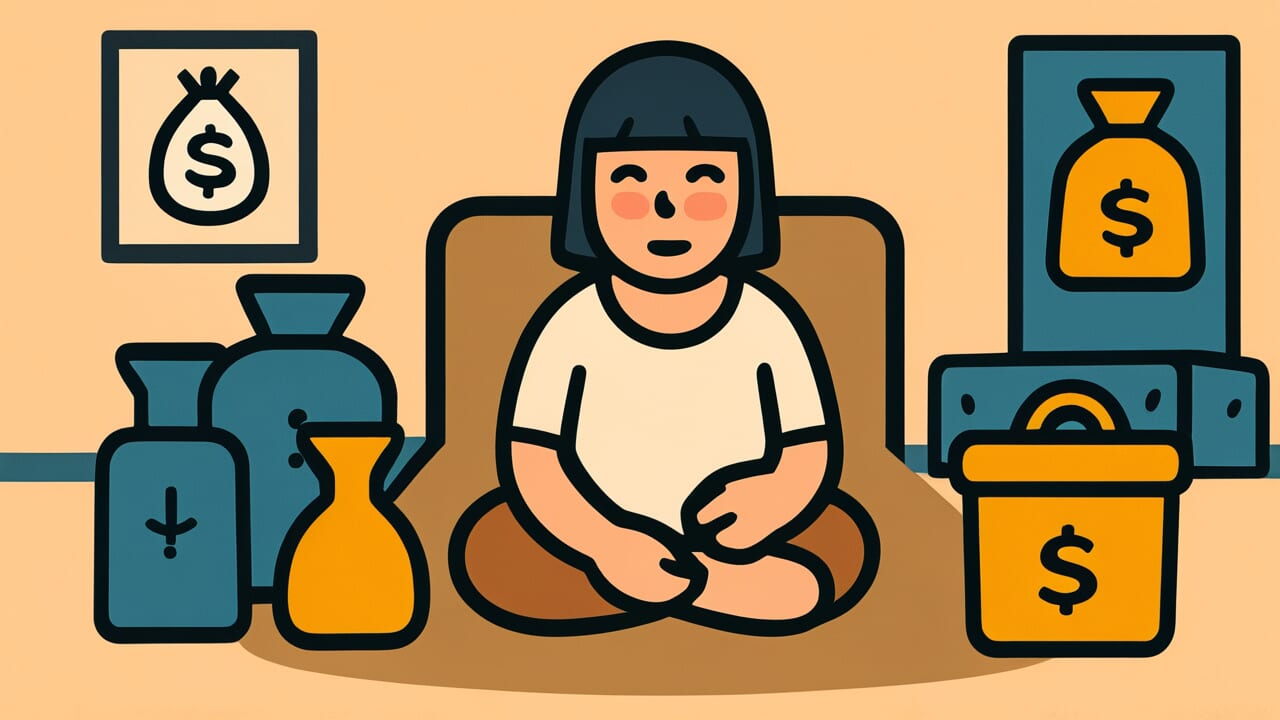How to Read “Less wealth, less sorrow”
Takara sukunakereba kanashimi sukunashi
Meaning of “Less wealth, less sorrow”
This proverb means that having less wealth brings fewer worries about losing it. The more possessions you own, the more anxiety you feel about losing them.
You also face more trouble maintaining them and more fear of theft or disaster. On the other hand, owning fewer things frees you from these worries.
You can live with greater peace of mind. This proverb reveals a truth about life.
People use this expression to show that material wealth and inner peace don’t always go together. It’s helpful when talking to someone obsessed with accumulating possessions.
It offers a different perspective on what matters. It also explains the mindset of those who choose simple living.
In modern society, many people chase material wealth. But this proverb reminds us that ownership comes with burdens.
It helps us recognize the value of traveling light. It shows us the freedom found in a simple life.
Origin and Etymology
The exact source of this proverb is unclear. However, it likely emerged from Japanese spiritual culture influenced by Buddhism and Taoist philosophy.
It connects deeply with Buddhist teachings about finding peace by letting go of attachments.
The word “wealth” includes not just money but land, houses, and all possessions. Looking at common people’s lives during the Edo period makes this proverb’s meaning clearer.
Fires broke out frequently back then. Wealthy merchants lived in constant fear of losing everything.
Meanwhile, craftsmen and day laborers who lived hand-to-mouth had a certain carefree quality. They had little to lose.
This proverb also shares wisdom with ancient Chinese philosophy, especially Laozi’s teaching about “knowing what is enough.” The insight that owning more doesn’t guarantee happiness appears throughout Eastern thought.
This proverb developed as these philosophical ideas merged with Japanese people’s lived experiences. It reflects our ancestors’ keen observation of the relationship between wealth and peace of mind.
Usage Examples
- He doesn’t own a luxury car or big house, but following “Less wealth, less sorrow,” he always has a calm expression
- After starting to declutter, I realized the truth of “Less wealth, less sorrow”
Universal Wisdom
This proverb has been passed down because it reveals the deep connection between human desire for ownership and anxiety. People instinctively try to gain security by owning more.
But ironically, the more we acquire, the greater our fear of losing it becomes. The two grow together.
Owning property means more than just possessing things. It also means taking on things to protect, manage, and worry about.
Will thieves break in? Will there be a fire? Will the value drop? Ownership always casts a shadow of anxiety.
Wise people throughout history have noticed this contradiction. The desire for wealth can steal away peace of mind.
This paradoxical truth touches something fundamental about human nature. It remains relevant across all eras.
Interestingly, this proverb doesn’t glorify poverty. Instead, it calmly examines the essential nature of ownership.
There’s security in having things, but also anxiety. Understanding both sides helps us ask what truly matters to us.
True freedom might not come from owning much. It might come from being released from unnecessary burdens.
When AI Hears This
According to prospect theory, humans feel the pain of losing 10,000 yen about 2.25 times more strongly than the joy of gaining 10,000 yen.
As wealth increases, the joy from gains grows slowly. But the pain from potential losses expands rapidly.
For example, someone with 100,000 yen in savings can only lose 100,000 yen. But someone with 100 million yen faces countless risks constantly.
Stock market crashes, fraud, theft, inflation—the list goes on. What’s tricky is that the human brain sets “what you have” as the baseline.
Once you have 100 million yen, it becomes normal. If it drops to 90 million, you feel the pain of losing 10 million.
Even more interesting is how diversified wealth creates a “loss portfolio” that explodes with combinations. Own real estate, stocks, precious metals, and foreign currency—that’s four types.
You must monitor each one daily for potential drops. With four options, you don’t just have four worries.
Your brain generates 16 different bad scenarios from their combinations.
As a result, happiness from increasing wealth hits a ceiling. But the fear of losing it accelerates exponentially.
This is the paradox of ownership. With less wealth, this asymmetric pain system simply doesn’t activate.
Lessons for Today
Modern society constantly urges us to “own more.” A bigger house, a newer car, more savings.
But this proverb gives us a chance to pause and think. What do we really need?
The key is not to take this proverb as extreme advice to live in poverty. Rather, understand the nature of ownership.
Find the right balance for yourself. What’s weighing down your heart?
Clothes you don’t wear, books you don’t read, relationships you maintain out of obligation. Letting these go might create new freedom.
Today, it’s not just physical possessions that bind us. Information and digital data also become constraints.
Social media follower counts, unread emails, photos piling up in the cloud. These are also “wealth” in a broad sense.
They become burdens to manage. Regularly review what you own. Keep only what truly matters.
This way of living might lead to peace of mind.



Comments